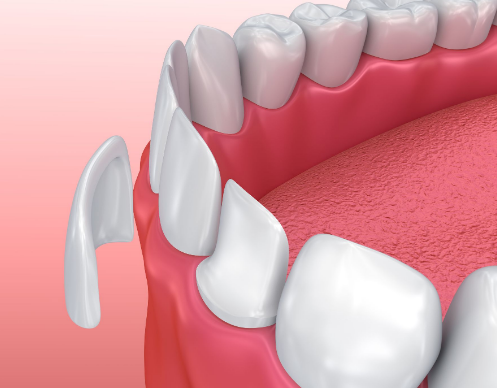Porcelain Veneers: Enhance Your Smile with Confidence

Have you ever dreamed of having a flawless, radiant smile? Porcelain veneers might be the perfect solution for you! In this article, we will explore the world of porcelain veneers, their benefits, the process of getting them, and how to maintain them for long-lasting results. Let’s dive in and discover the wonders of porcelain veneers.
1. Introduction
Your smile is an important asset that contributes to your overall appearance and self-confidence. If you have dental imperfections such as stained, chipped, or misaligned teeth, it’s natural to desire a smile transformation. Porcelain veneers offer a versatile and effective way to enhance your smile and achieve the dazzling set of teeth you’ve always desired.
2. What are Porcelain Veneers?
Porcelain veneers are thin, custom-made shells crafted from high-quality dental porcelain. These shells are designed to cover the front surface of your teeth, concealing imperfections and creating a natural-looking, beautiful smile. Porcelain veneers are known for their durability, stain resistance, and ability to mimic the appearance of natural teeth.
3. Benefits of Porcelain Veneers
Porcelain veneers offer numerous benefits that make them a popular choice among those seeking smile makeovers. Some key advantages of porcelain veneers include:
Transformative Aesthetics
Porcelain veneers can dramatically improve the appearance of your smile. They can address a variety of dental concerns, such as discoloration, cracks, chips, gaps, and even crooked teeth. With veneers, you can achieve a harmonious, symmetrical smile that boosts your confidence.
Natural Appearance
One of the remarkable features of porcelain veneers is their ability to closely resemble natural teeth. The translucent properties of porcelain mimic the light-reflecting qualities of tooth enamel, ensuring a seamless blend with your existing teeth.
Durability and Longevity
Porcelain veneers are highly durable and resistant to stains. With proper care and maintenance, they can last for many years, providing you with a beautiful smile that withstands the test of time.
4. The Process of Getting Porcelain Veneers
Getting porcelain veneers typically involves several steps, including:
Consultation and Evaluation
The first step is to schedule a consultation with a qualified dentist experienced in cosmetic dentistry. During this appointment, the dentist will evaluate your oral health, discuss your goals, and determine if porcelain veneers are suitable for you.
Treatment Planning
If you are an ideal candidate for porcelain veneers, the dentist will create a personalized treatment plan. This involves designing your desired smile and preparing your teeth for veneer placement.
Teeth Preparation
To ensure a proper fit, a small amount of enamel from the front surface of your teeth will be gently removed. This step is essential to accommodate the thickness of the veneers and create a natural-looking result.
Impressions and Temporary Veneers
The dentist will take impressions of your teeth, which will be sent to a dental laboratory for customization. In the meantime, temporary veneers may be placed to protect your teeth and give you a preview of your new smile.
Veneer Bonding
Once your custom porcelain veneers are ready, you will return to the dentist for the final bonding process. The dentist will carefully place the veneers onto your teeth, ensuring a proper fit and alignment. A special dental adhesive is used to securely bond the veneers to your teeth.
Final Adjustments and Polishing
After the veneers are bonded, the dentist will make any necessary adjustments to ensure proper bite alignment and comfort. They will also polish the veneers, giving them a natural shine that seamlessly blends with your other teeth.
5. Are Porcelain Veneers Right for You?
While porcelain veneers offer remarkable benefits, they may not be suitable for everyone. It’s essential to consult with a dentist to determine if veneers are the right choice for you. Some factors that may affect candidacy include:
Oral Health
Good oral health is crucial for successful veneer placement. Any underlying dental issues, such as tooth decay or gum disease, must be addressed before considering veneers.
Teeth Alignment
If you have severely misaligned teeth or require extensive orthodontic treatment, veneers may not be the ideal solution. In such cases, your dentist may recommend alternative treatments like braces or clear aligners.
Tooth Structure
Sufficient tooth enamel is necessary for the bonding process. If your teeth are excessively worn down or have minimal enamel, veneers may not be feasible. Your dentist can suggest alternative options to enhance your smile in such situations.
6. Maintaining Porcelain Veneers
To ensure the longevity and beauty of your porcelain veneers, it’s important to maintain proper oral hygiene and follow your dentist’s recommendations. Here are some tips for caring for your veneers:
Oral Hygiene
Maintain a regular oral hygiene routine, including brushing twice a day with a non-abrasive toothpaste, flossing daily, and visiting your dentist for regular check-ups and cleanings.
Avoid Excessive Force
While porcelain veneers are durable, they can be susceptible to damage from excessive force or impact. Avoid biting or chewing on hard objects such as ice, pens, or fingernails.
Stain Prevention
Although porcelain veneers are stain-resistant, it’s still important to minimize exposure to substances that can cause staining. Limit consumption of foods and beverages like coffee, tea, red wine, and tobacco products that can discolor your veneers.
7. Common Concerns and FAQs
Can porcelain veneers be whitened?
No, porcelain veneers cannot be whitened. It’s essential to discuss tooth whitening goals with your dentist before getting veneers to ensure a consistent and natural-looking shade.
Are porcelain veneers reversible?
The process of getting porcelain veneers involves the removal of a small amount of tooth enamel, which is irreversible. It’s important to carefully consider your decision and consult with your dentist before proceeding.
Can I still get cavities with porcelain veneers?
While the veneers themselves are not susceptible to decay, the underlying tooth structure is still vulnerable. It’s crucial to maintain good oral hygiene and visit your dentist regularly to prevent cavities and maintain overall oral health.
Can I eat normally with porcelain veneers?
Yes, porcelain veneers are designed to withstand normal biting and chewing forces. However, it’s advisable to avoid excessively hard or sticky foods that can potentially damage the veneers.




